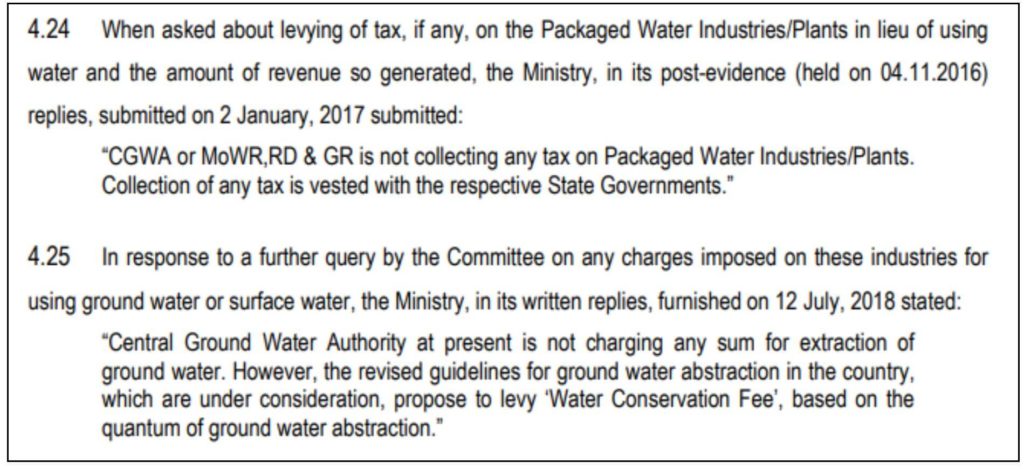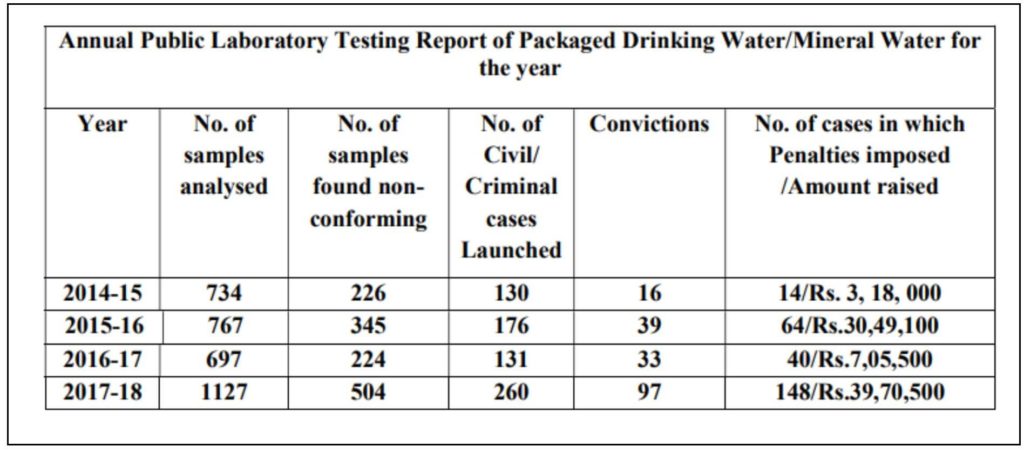The parliamentary standing committee on water resources which looked at the issue of ‘Socio-economic impact of commercial exploitation of water by industries’ observed that the turnover of 5 major packaged drinking water companies increased from ₹ 60 billion in 2013 to ₹ 160 billion in 2017. The committee has called for an assessment of income & turnover of these companies among many other recommendations.
The Standing Committee on Water Resources, River Development and Ganga Rejuvenation submitted its report ‘Socio-economic impact of commercial exploitation of water by industries’ in August 2018 with recommendations listed to tackle the problems resulting from the exploitation of water resources by industries for commercial purposes. An Action Taken Report was laid in the parliament in March 2020. In an earlier story, seven of the sixteen recommendations and actions taken with respect to each were discussed. The remaining will be discussed in this story.
35% of Water requirement for industries is met using groundwater
Issue: FSSAI grants licenses to packaged drinking water and mineral water units as per the provisions laid down under the Food Safety and Standards Regulations, 2011 irrespective of source of water used. Details of existing Water Intensive Industries across states are not available with this Ministry.
Recommendation: Source of water that will be used for production should be an additional criterion for granting license which will help check the use of groundwater. Ground water is used to meet 35% of water requirement, by water intensive industries including textiles, dairy, tanneries, and even drinking/mineral water units. Use of surface water should be encouraged.
Action Taken: FSSAI considers only those requests from industries that have a NOC from CGWA for groundwater extraction. Since inception, CGWA has accorded NOC to 375 packaged drinking water units using groundwater. Source of water will be included as a criterion in the proposed new Regulations for Licensing and Registration of Food Businesses.
Comments: The standing committee observed that the time period by when the proposed amendment to the rules for licensing will be incorporated has not been stated by the Ministry.
No charge/tax is levied on groundwater usage for commercial purposes by industries
Issue: There are over 5873 packaged drinking water units which hold BIS license for producing packaged drinking water. FSSAI has granted license to 5417 packaged drinking water industries. However, no charge or tax is levied on packaged water industries against consuming groundwater.

Source: Standing Committee report
Recommendation: Commercial use of water should be charged. This will discourage wastage and the revenue collected by governments can be used for increasing access to safe water for the poor.
Action Taken: Water, including natural and artificial mineral water, and aerated water, which do not contain sweetening or flavouring substances are charged 18% GST. Drinking water packed in 20L bottles are charged 12% GST. The introduction of Water Conservation Fee (WCF) also aims to check groundwater usage.
Turnover of drinking water brands increased by 100 billion rupees in four years
Issue: PepsiCo’s Aquafina and Coca-Cola’s Kinley are some renowned packaged drinking water brands in India. Five major brands in the sector recorded a growth in turnover of ₹100 billion, from ₹60 billion in 2013 to ₹160 billion in 2017. The turnover is only expected to have increased further since the demand for safe drinking water has surged.
Recommendation: Instead of citing water as state subject, the committee has asked the Ministry of Water Resources to work with MSME Ministry and Department of Revenue of Finance Ministry to carry out an assessment of income and profit earned by packaged water industries. Pricing policy and a national policy on commercial use of water needs to be chalked out to control usage by water intensive industries since water is considered a ‘free’ raw material.
CGWA has guidelines on extraction of groundwater by water intensive industries. National Water Policy suggests action plans for industrial use of water such as water use efficiency, water pricing, etc. However, there is no specific policy framed that deals with commercial utilization of water.
Action Taken: National Water Policy, 2012 ensures equitable access to water and its fair pricing for multiple purposes including drinking, agricultural, sanitation, and industrial usage. Reuse and recycling of water is also encouraged under the policy. WCF is another measure cited by the ministry.
A national policy covering multiple aspects of commercial exploitation of water is required
Comments: The committee observed that the National Water Policy is not being implemented effectively. It went onto say that the response of ministry lacks information on conduct of assessment/study on revenue generated by industries. The committee re-iterated its recommendation to study profitability of drinking water industries and formulating a national policy with a proper framework and regulations covering multiple aspects such as source of water to be used, quantity, pricing and taxation, social and environmental obligations for industries, etc. to control water intensive industries. As CSR projects, industries should involve in activities like maintenance of water bodies, installation of community level water purifiers in villages, recycling used water bottles, etc.
Better Monitoring along with Health Ministry is the need of the hour
Issue: Between 01 April 2013 to 30 September 2016, 17% of samples drawn from Packaged Drinking Water were found to have fallen below stipulated standards. In case of packaged natural mineral water, 6.5% of the samples (10 out of 145) had failed. Action was taken against only 24-30% of failed samples.

Recommendation: More stringent actions need to be taken to ensure good quality of packaged water. A robust water quality monitoring mechanism should be set up.
Action Taken: Under Food Safety Regulations, 2011, the manufacture and sale of packaged drinking water and mineral water should be under the BIS Certification Mark. BIS recorded 511 violations between 2008-09 and 2017-18 and collected a penalty of over ₹ 55 lakhs.
Ministry also stated that regular inspections were conducted by food safety departments to ensure compliance. Between 2014-15 and 2017-18, 3325 samples were analysed of which 39% (1299) were found non-conforming. A total of 697 cases were launched. The conviction was only 185.

Source: Action Taken Report, 2020
Comments: The committee emphasized on the need for a monitoring mechanism in collaboration with the Health Ministry.
Industrial plants in India consumer 2 to 3.5 times more water per unit of production as compared with similar plants in developed nations
Issue: Water Resources Ministry has proposed Water Audit and Water Conservation guidelines and incentives to ensure efficient use of water.
Recommendation: The formulation and implementation of proposed guidelines, hefty charges to discourage groundwater usage, and introduction of incentives for efficient usage should be done at the earliest.
Action Taken: Along with imposition of WCF, CGWA has made it mandatory to conduct water audit by industries which extract more than a stipulated quantum of water from assessment units.
Strengthening Urban Local Bodies to improve Water Conservation
Issue: Groundwater usage regulation is the responsibility of state ground water boards/ departments. Supply of potable water to town/city is carried out by urban local bodies. Private groundwater extraction is also more rampant in urban areas. Urban local bodies have the potential to play a major role in checking groundwater usage and reduction of wastage of available water resources.
Recommendation: States should strengthen ULBs by allocating resources to prevent uncontrolled water usage and help in water conservation.
Action Taken: The suggestion has been forwarded to the Ministry of Housing and Urban Affairs (MoH&UA).
Increase affordability of Safe Drinking Water through initiatives like Water ATMs
Issue: Increasing access and affordability of safe drinking water for general public is very much required.
Recommendation: Water ATMs/ kiosks help in increasing accessibility to safe drinking water to the public at cheaper rates, especially in parks, bus stands, etc. New Delhi Municipal Corporation has established over 37 such water ATMs in and around public places, and a proposal to establish another 40 ATMs on PPP model by September 2018 was submitted. Reduction in ‘plastic pollution’ will also be addressed to an extent. Indian railways has also installed hundreds of water vending machines in most stations.
Action Taken: The suggestion has been forwarded to the MoH&UA.
Government should play a greater role in access to Safe Drinking Water
Issue: Supply of safe drinking water should not be left to private companies which want to reap profits.
Recommendation: Government should play a more proactive role in making safe and pure water available to the public at nominal rates. Different ministries and departments should come together and ensure the gap in accessibility to water be filled.
Action Taken: The suggestion has been forwarded to MoH&UA and Ministry of Drinking water and Sanitation.
Featured Image: Packaged Drinking Water Companies


